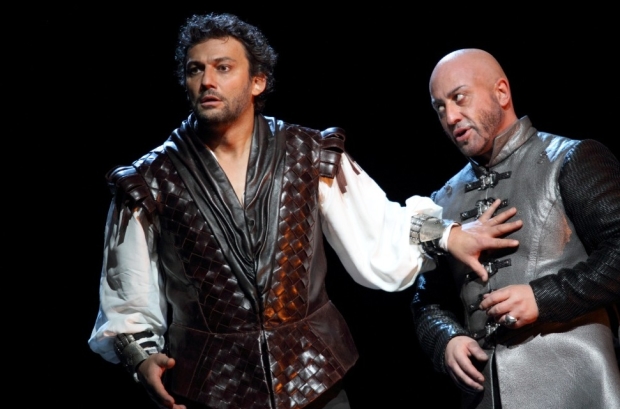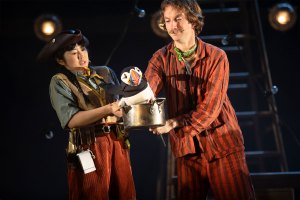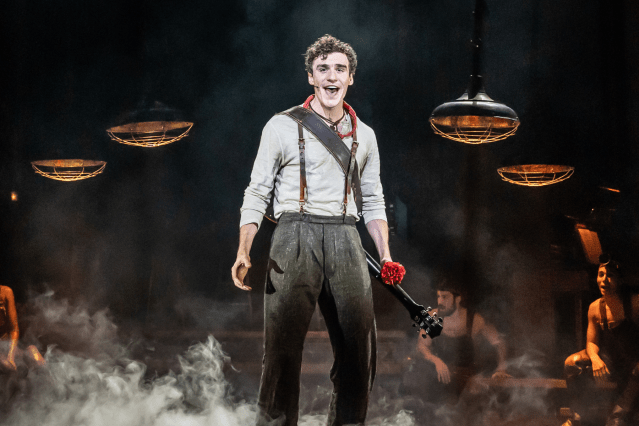Review: Otello (Royal Opera House)
Covent Garden’s new production of Verdi’s dark Shakespearean opera stars Jonas Kaufmann

© Catherine Ashmore
The Royal Opera's new production of Verdi's late masterpiece is a night of two halves. Director Keith Warner begins part one (Acts 1 & 2) with Iago alone in a spotlight and part two (Acts 3 & 4) with Otello likewise; thus he announces his focus for each segment: for the first hour the bad guy's machinations fuel the engine, then the hero takes over and heads for the cliff edge.
It's also a night of two aesthetic parts, albeit less evenly split. Warner and set designer Boris Kudlička have conceived a darkly forbidding environment for the drama in which tall, shifting stage elements glide and meld amid breathtaking illuminations by lighting guru Bruno Poet. As an exercise in austere impressionism it's one of the most exciting designs Covent Garden has seen in years; until, that is, the arrival of a giant Lion of Venice tips the tone towards literalism. When Emilia (the excellent Kai Rüütel) plumps up real white pillows on a real white bed in Desdemona's real white bedroom, all that's missing is a scarlet splash of blood. It duly arrives.
Whatever happened to the original palette? It's as if the creatives decided it worked for everything bar this one scene, so like an inconvenient election manifesto they ditched it.
Tenor Jonas Kaufmann makes his role debut as Otello and he impressed mightily, even though his floated head notes lacked their accustomed beauty. His artistry ensured that the 'grief' aria, "Dio, mi potevi", was a properly chilling experience but he unleashed insufficient Italianate power at Verdi's challenging heights.
The German star convinced absolutely as a victorious commander whose aptitude for sexual jealousy is matched only by his gullibility. A Moor in natural skin, Kaufmann left Otello's 'otherness' to the imagination – and I'd defy anyone to say they missed the make-up. Laurence Olivier's boot polish has followed Love Thy Neighbour into history's dustbin.
'Pappano's orchestra was electrically alive'
Ludovic Tézier's removal from the role of Iago has allowed Italian baritone Marco Vratogna to seize the day as Villain No. 1, and he was a revelation. Manipulatively dominant throughout part one, he lurked like a vampire of the senses thereafter as his evil plans unfolded. His first-act drinking song was rich in subtle scheming, his perverted Credo a baleful declaration that here is the Devil's advocate. It was a blazing performance, the more so for being unheralded.
Maria Agresta, while in fine vocal fettle, struggled early on to project Desdemona's heartbreak at her beloved husband's hostility, but she located the pathos in time to deliver a moving 'Willow Song' and to touch us as she died. Among a strong set of supporting players, Frédéric Antoun's Cassio and In Sung Sim's Lodovico stood out.
Antonio Pappano's conducting was, it almost goes without saying, close to ideal. Robust and well balanced, his reading of Verdi's score was impeccably phrased and brimmed with drama. His orchestra was electrically alive to his beat, as was the ROH Chorus, a busy extra character that's been shrewdly disposed en bloc by Warner to allow for maximum choral impact.
A few additional reservations peppered the experience of this Otello, but they're mostly small. Kaufmann's verbal abasement of Desdemona had a restraint that was out of kilter with his physical viciousness – it should be gingered up – and the introduction of a lateral trough in the floor after the interval led heads to bob comically as people crossed it. Still, as a finished product it's 10% correctable and 90% already there. The Royal Opera should hang on to this one. It's a keeper.
Otello continues in repertory until 15 July. Some performances have an alternate cast led by Gregory Kunde, Željko Lučić and Dorothea Rôschmann. The performance on 28 June will be relayed to cinemas a part of ROH Live.












